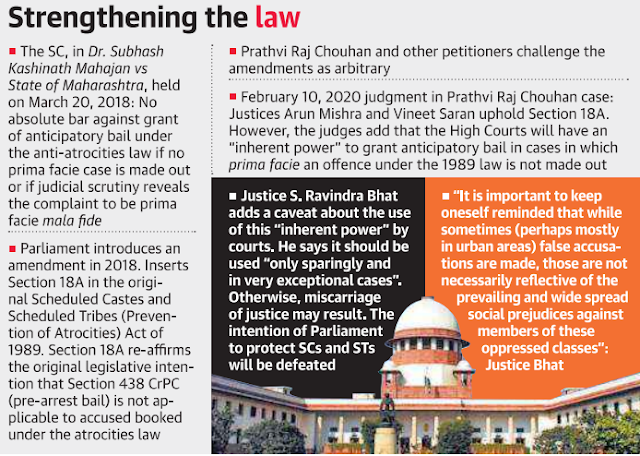From UPSC perspective, the following things are important :
Prelims level: Not Much
Mains level: Protection of SCs and STs against caste based atrocities

The Supreme Court has upheld the SCs/STs (Prevention of Atrocities) Amendment Act of 2018, which nullified it’s own controversial March 20, 2018 judgement. Earlier judgment had diluted the original 1989 legislation, saying they were using its provisions to file false criminal complaints against innocent persons.
Why such ruling?
- The 2018 Act had nullified a March 20 judgment of the Supreme Court, which allowed anticipatory bail to those booked for committing atrocities against Scheduled Castes and Scheduled Tribes members.
- The original 1989 Act bars anticipatory bail.
- The Supreme Court verdict saw a huge backlash across the country. Several died in ensuing protests and property worth crores of rupees was destroyed.
- The government reacted by filing a review petition in the Supreme Court and subsequently amended the 1989 Act back into its original form.
- The government had enacted the Amendments, saying the SCs and STs continued to face the same social stigma, poverty and humiliation which they had been subjected to for centuries.
Why was the SC/ST Act enacted?
- Since crimes against SCs and STs are fundamentally hate crimes, the Rajiv Gandhi enacted the Act in 1989.
- It gave furtherance to the provisions for abolition of untouchability (Article 17) and equality (Articles 14, 15).
Why it was amended?
- The Bench reasoned that human failing and not caste is the reason behind the lodging of false criminal complaints.
- The Supreme Court condemned its own earlier judgment, saying it was against “basic human dignity” to treat all SC/ST community members as “a liar or crook.”
- Caste of a person cannot be a cause for lodging a false report, the verdict observed.
- Members of the SCs and STs, due to backwardness, cannot even muster the courage to lodge an FIR, much less, a false one, the judgment noted.
The Subhash Kashinath Mahajan case
- Mahajan was Director of Technical Education in Maharashtra.
- Two non-SC officers had made an adverse entry on the character and integrity of a Dalit employee, whom Mahajan in 2011 denied sanction for prosecution against those officers.
- The denial was challenged on the ground that the state government and not the director was the competent authority.
- The apex Court held that safeguards against blackmail are necessary as by way of rampant misuse, complaints are largely being filed against public servants with oblique motive for the satisfaction of vested interests.
In what manner had the 2018 judgment diluted provisions for arrest?
ANTICIPATORY BAIL
- In section 18 of the Act, Parliament had laid down that the provision of anticipatory bail under Section 438 of the CrPC of 1973 will not be available to an accused under the Act.
- The provision of anticipatory bail was introduced for the first time on the recommendation of 41st Law Commission in 1973.
- It is a statutory right, not part of the right to life and personal liberty under Article 21 of the Constitution, and thus there is no fundamental right to anticipatory bail.
- In the 2018 judgment, the Court laid down safeguards, including provisions for anticipatory bail and a “preliminary enquiry” before registering a case under the Act.
- While review the Bench said Section 18 was enacted to instil a sense of deterrence and relied on Kartar Singh (1994) in which the court had held that denial of anticipatory bail does not violate Article 21.
FIR
- The court had observed that “liberty of one cannot be sacrificed to protect another”, and the “Atrocities Act cannot be converted into charter for exploitation or oppression by unscrupulous persons or by police for extraneous reasons”.
- He ordered that neither is an FIR to be immediately registered nor are arrests to be made without a preliminary inquiry by an SSP.
- An arrest can only be made if there is “credible” information and police officer has “reason to believe” that an offence was committed.
- In the review judgment, Justice Mishra said public servants already have a remedy in false cases under CrPC Section 482 and can get such FIRs quashed by High Courts.
- He rejected the need of an SSP’s approval for arrest.
PERMISSION
- In 2018, the court had said that even if a preliminary inquiry is held and a case registered, arrest is not necessary, and that no public servant is to be arrested without the written permission of the appointing authority.
- The court extended the benefit to other citizens and said they cannot be arrested without the written permission of the SSP of the district.
- In review the court said that the decision on arrest is to be taken by the investigating authority, not the appointing authority.
Were other provisions diluted?
- The court had observed that interpretation of Atrocities Act should promote constitutional values of fraternity and integration of the society.
- This may require ‘check on false implication of innocent citizens on caste lines’.
- Observing that the law should not result in caste hatred, the court overlooked the fact that the Act had to be enacted due to caste hatred.
- The review judgment said that such riders for registering a report are wrong and it would give an advantage to upper castes whose complaints can be registered without any such inquiry.
How frequently do SCs/STs face atrocities?
- A crime is committed against an SC every 15 minutes. Six SC women are raped every day on an average.
- Between 2007 and 2017, there was a 66 per cent growth in crimes against SCs.
- Data from the National Crime Record Bureau, which the 2018 judgment was based on, showed cases of rape of SC women had doubled in 10 years.
Assist this newscard with:
Get an IAS/IPS ranker as your 1: 1 personal mentor for UPSC 2024
